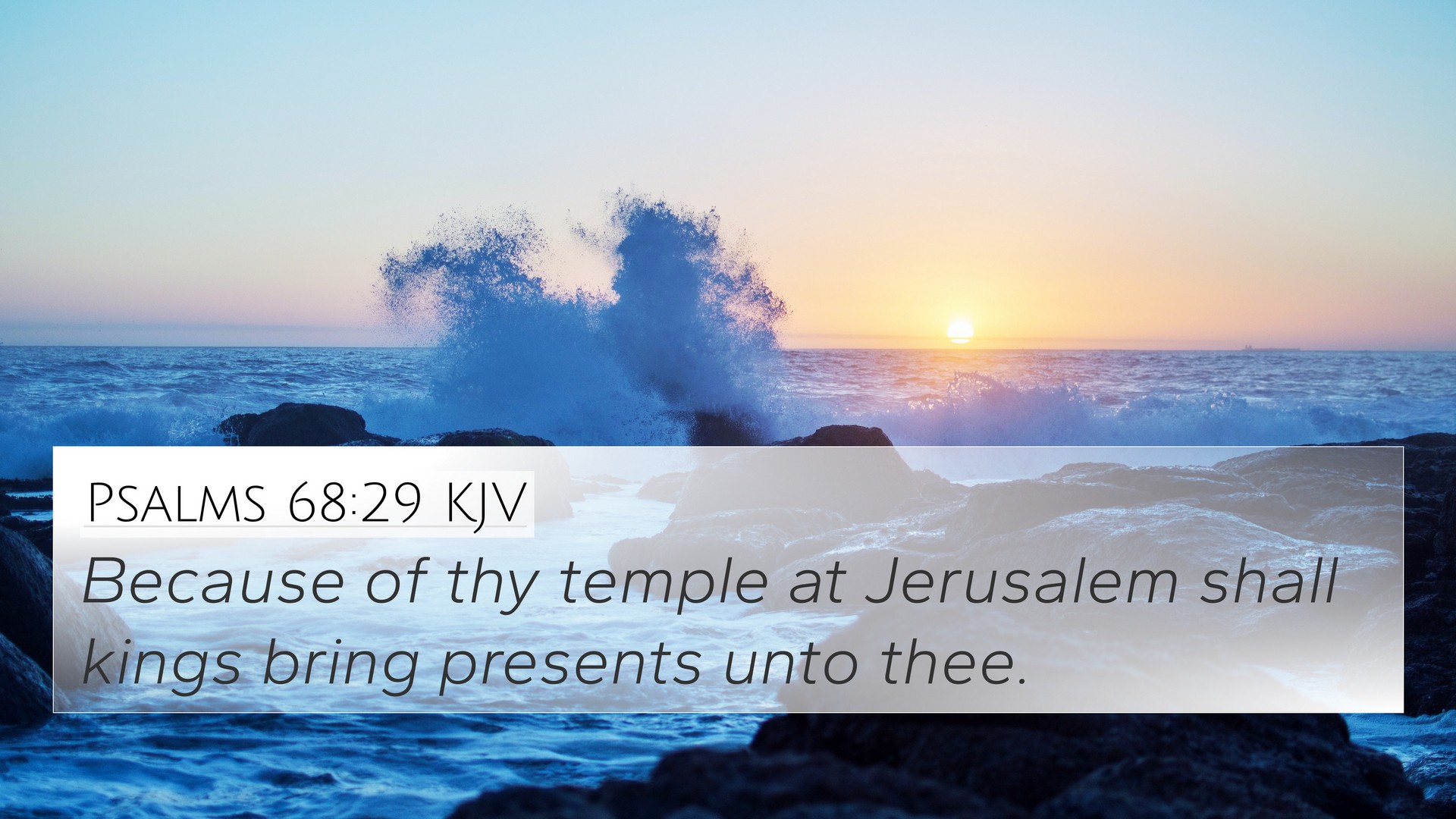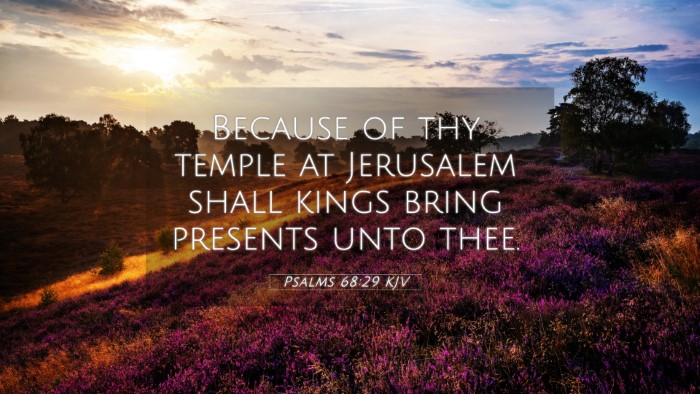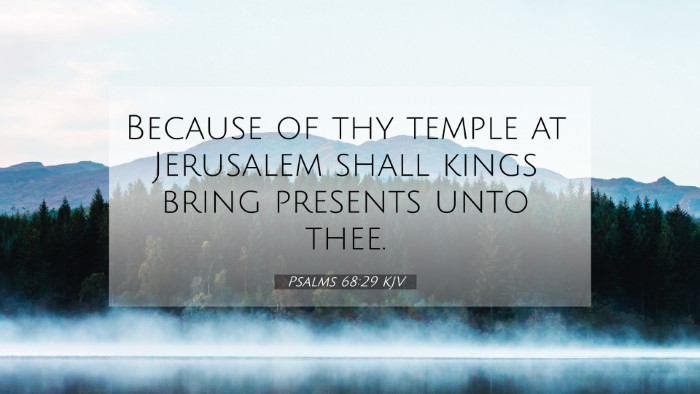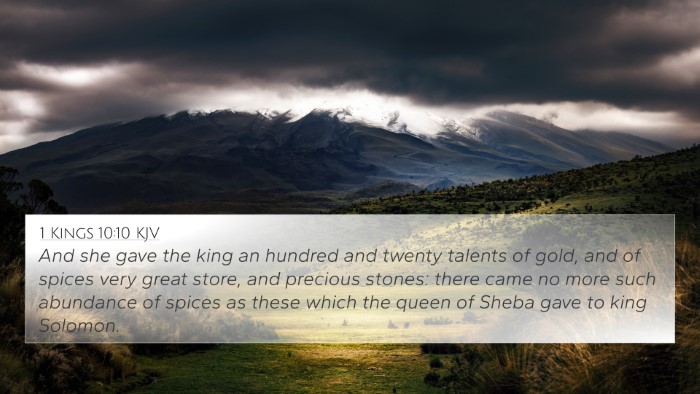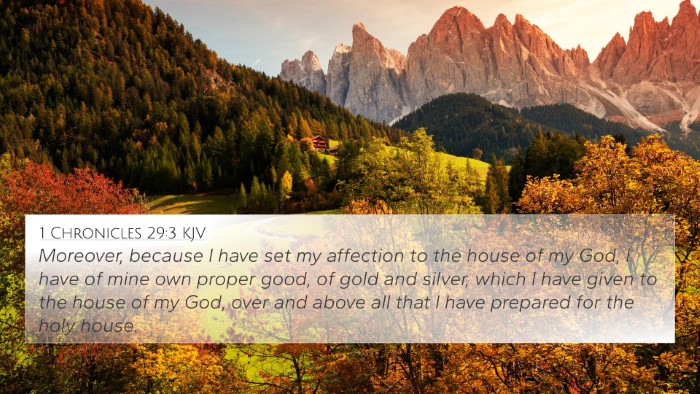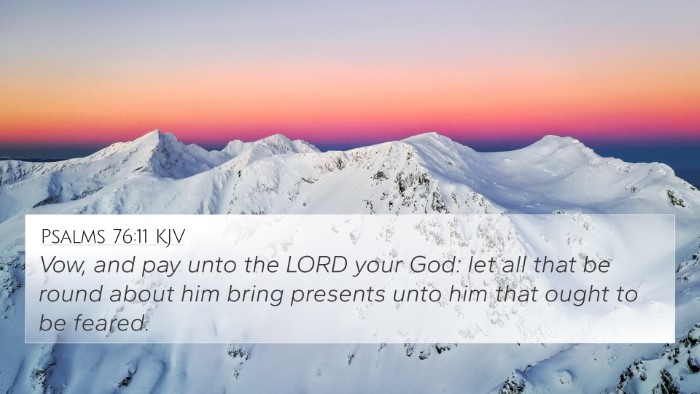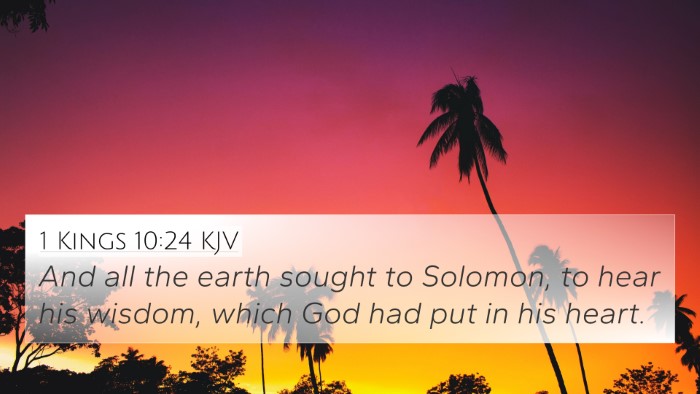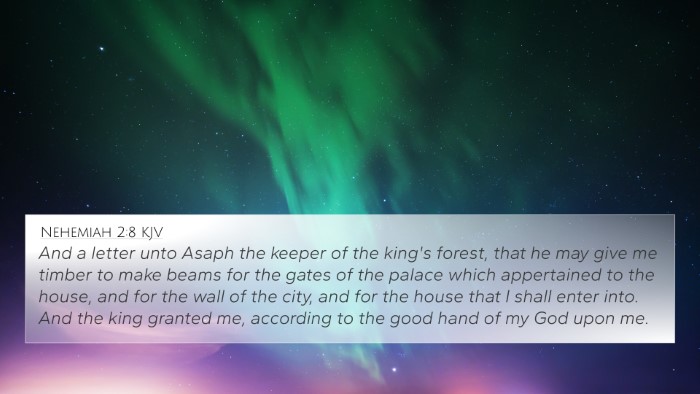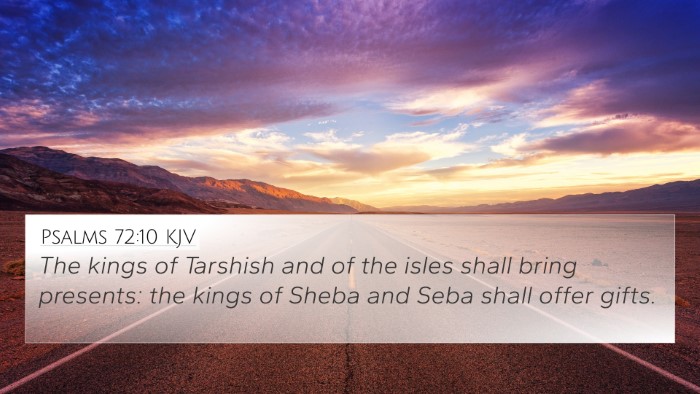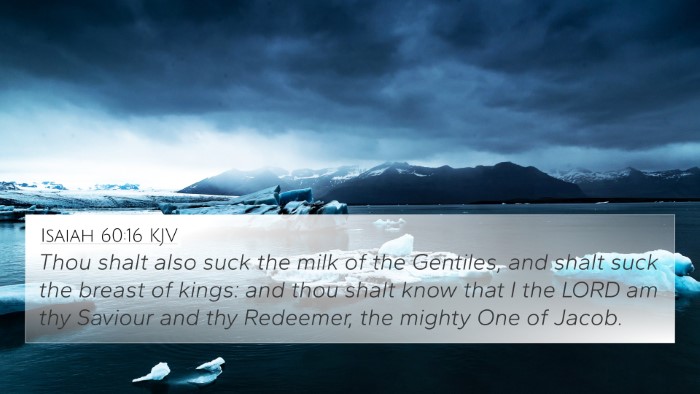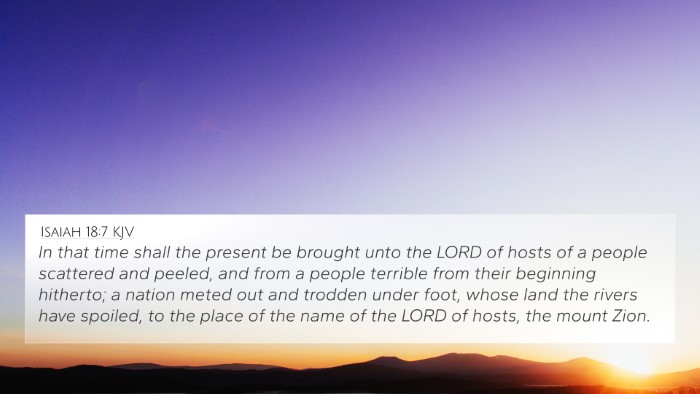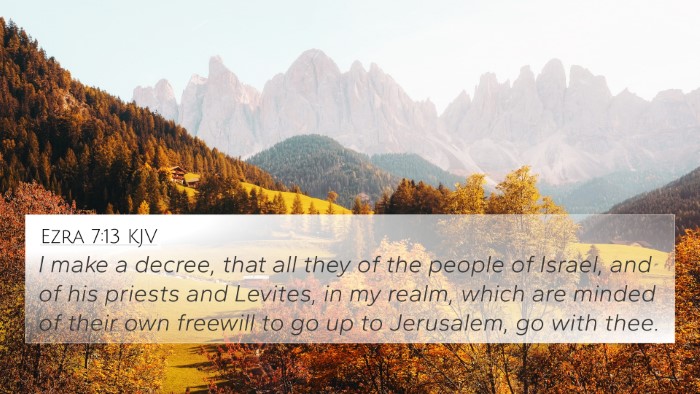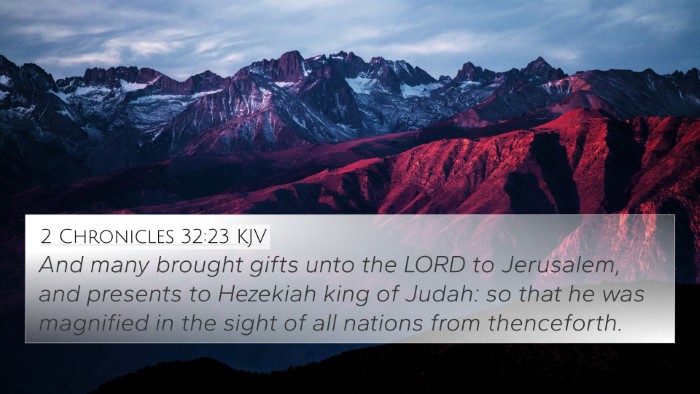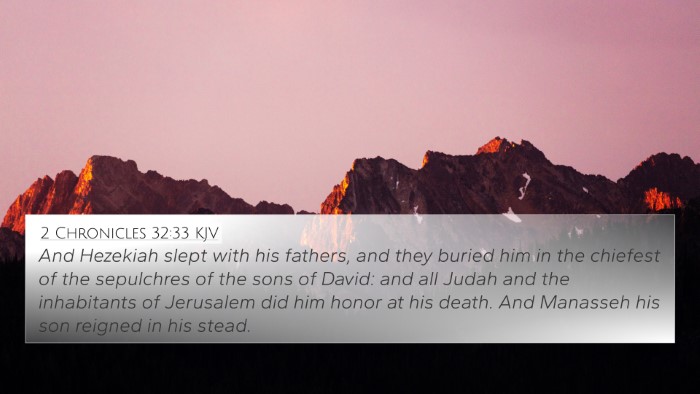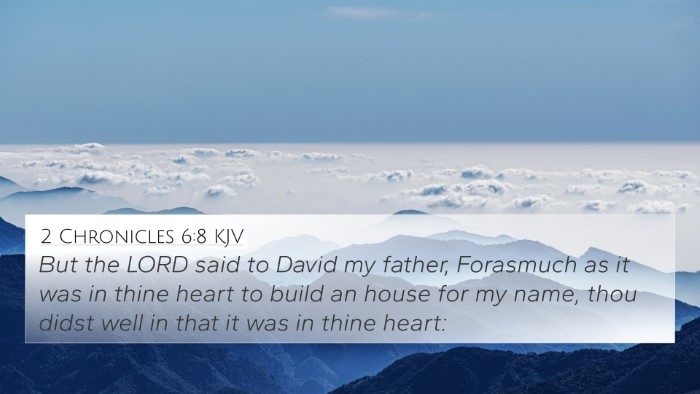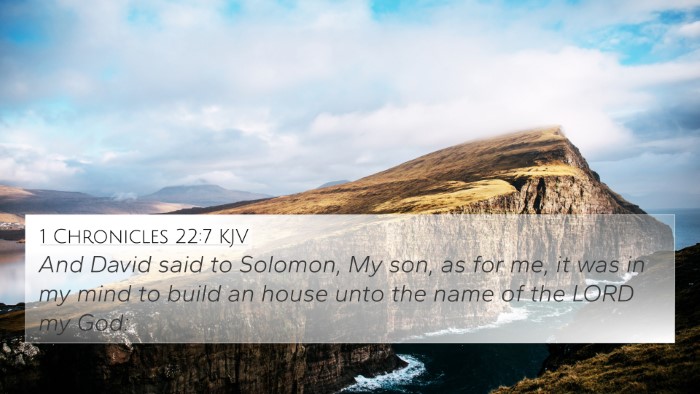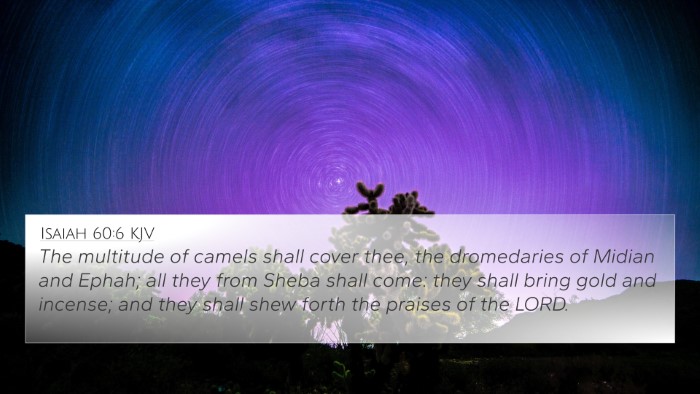Understanding Psalms 68:29
Psalms 68:29 states: "Because of thy temple at Jerusalem shall kings bring presents unto thee." This verse reflects the majesty of God and His dwelling place, emphasizing the significance of the temple in Jerusalem as a center of worship and devotion.
Exegesis and Insights from Public Domain Commentaries
This verse has been interpreted and analyzed by several renowned commentators, each offering unique perspectives and understanding.
-
Matthew Henry:
Henry emphasizes the glory and power of God, asserting that kings are drawn to God's presence and will voluntarily bring gifts, acknowledging His sovereignty. The temple symbolizes divine authority and the kingly acknowledgment of God's majesty.
-
Albert Barnes:
Barnes focuses on the temple as a representation of God's presence among His people. He draws attention to the anticipation that nations would come to worship, illustrating the universal recognition of God's Lordship. Barnes highlights the prophetic nature of this verse, foreseeing a day when worship will be a global act.
-
Adam Clarke:
Clarke provides a historical context by noting that many kingdoms would bring tribute to the God of Israel, not only out of obligation but in recognition of His supreme authority. He suggests that this reflects God's favor and a time when peace reigns, leading to reverence towards God from all nations.
Thematic Connections and Biblical Cross-References
Psalms 68:29 is rich with connections to other scriptures, revealing thematic ties that enhance its meaning. Below are some key cross-references that relate to this verse:
- Isaiah 60:3: "And the Gentiles shall come to thy light, and kings to the brightness of thy rising." This verse predicts the nations and kings coming to worship God, mirroring the theme of psalmist's declaration.
- Psalm 72:10: "The kings of Tarshish and of the isles shall bring presents: the kings of Sheba and Seba shall offer gifts." This highlights the expectation of nations bringing gifts to God.
- Revelation 21:24: "And the nations of them which are saved shall walk in the light of it: and the kings of the earth do bring their glory and honor into it." This suggests a future fulfillment of worship among nations before God.
- Matthew 2:11: The visit of the Magi who brought gifts to Jesus is a New Testament fulfillment reflecting the homage kings pay to divine authority.
- Deuteronomy 17:16-17: Outlines instructions for kings, linking temporal authority with divine instruction and the recognition of God’s supremacy.
- Philippians 2:10-11: "That at the name of Jesus every knee should bow... and that every tongue should confess that Jesus Christ is Lord." This indicates the ultimate acknowledgment of divine authority by all.
- 1 Chronicles 29:21: "...and they offered sacrifices unto the LORD, and did eat and drink before the LORD on that day with great gladness." This shows the action of offering to God in worship, akin to kings bringing presents.
- Zechariah 14:16: Implying that all nations will eventually worship before the Lord in Jerusalem, aligning with the psalmist's declaration of the nations’ tribute to the temple.
- Malachi 1:11: "For from the rising of the sun even unto the going down of the same my name shall be great among the Gentiles; and in every place incense shall be offered unto my name." This suggests a universal recognition of God’s greatness across the nations.
- Acts 10:35: "But in every nation he that feareth him, and worketh righteousness, is accepted with him." This ties into the core theme of God’s reach beyond Israel to all nations, encouraging worship and offerings.
Significance of the Temple in Jerusalem
The temple in Jerusalem serves as a central location for worship and sacrificial offerings. It represents the dwelling place of God among His people. The significance of this verse stretches beyond its immediate context, inviting deeper reflection on the reasons why nations, including kings, would be compelled to bring gifts to honor the Divine.
Connections and Comparative Analysis
In considering the connections between Psalms 68:29 and other verses, one can identify broader themes such as God's sovereignty, the response of nations to divine authority, and the future promise of universal worship. This thematic study encourages believers to explore how scripture speaks to each other, revealing layers of meaning and divine intent throughout biblical narratives.
Tools for Further Study and Cross-Referencing
For those interested in exploring cross-referencing Biblical texts, various tools are available:
- Bible Concordance - A valuable resource for locating terms and themes across the Bible.
- Bible Cross-Reference Guide - Guides that provide links between related verses.
- Cross-Reference Bible Study - Methods to enjoy deeper insights into interconnected scripture.
- Bible Chain References - A method of linking verses in a chain format for study.
- Comprehensive Bible Cross-Reference Materials - These resources facilitate understanding of scripture through linked texts.
Conclusion
Psalms 68:29 encapsulates a profound truth about God's nature and His relationship with the nations. By examining the scripture through public domain commentaries and cross-referencing with related verses, one gains a richer, more profound understanding of the text. Engaging with the Bible through comparative analysis and thematic connections unveils a tapestry of God's revelation throughout history, encouraging believers to appreciate the connections between Bible verses and their meanings.
